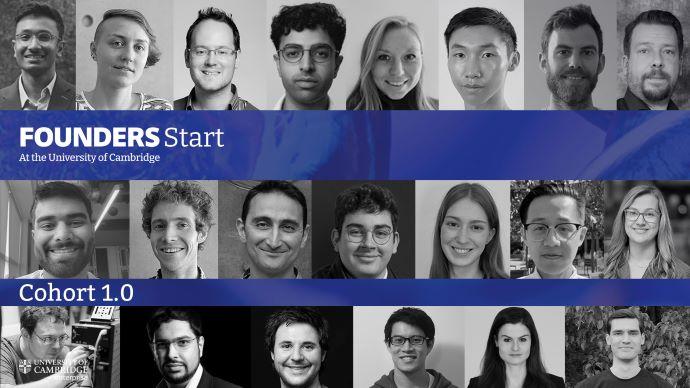- Founders at the University of Cambridge welcomes eleven innovative companies to the Start Accelerator 1.0 programme
- The start-ups, all founded by Cambridge students, alumni and academics, are working on difficult challenges across hardware, life sciences and sustainability
- The founding teams will receive early-stage funding, mentorship, development workshops and access to office and lab space during the three-month period
- The programme culminates in a Demo Day featuring investors from across the UK and Europe
Cambridge: Founders at the University of Cambridge, the flagship initiative supporting and accelerating University founders to make an ever greater impact, is revealing the eleven venture science start-ups taking part in its first Start Accelerator programme. Covering topics as varied as computer vision software for the semiconductor industry to fixing the UK electricity grid to power our Net Zero future, the start-ups are applying university research and technology to some of the world’s most difficult problems, with the programme designed to support them at some of the earliest stages.
The first Start Accelerator cohort
- AetoSense - applying patented technology to drive precision in air quality monitoring, addressing potential health hazards
- BioTryp Therapeutics - dividing bacteria to conquer infections and provide an alternative to traditional antibiotics, starting with urinary tract infections
- BravelyCultured - using a proprietary marine microbial biobank and solid-state cultivation methods to replace animal- and petroleum-based products
- Cambridge Vision Tech - early detection of Alzheimer’s
- Molyon - creating next generation high-energy density batteries for weight-critical applications
- Nanomation - building computer vision software for the semiconductor industry to enable clients to build products using advanced, complex nanomaterials
- Orbit - using non-invasive nanotechnology to create a smart fitness device for brains, making mental health data transparent and actionable
- Protonera - turning waste plastics into valuable commodities to make recycling work
- VOLTQUANT - fixing the UK electricity grid to solve one of the biggest challenges preventing Net Zero
- William Oak - developing a point-of-care test for micronutrient deficiencies to improve maternal, infant and child health
- Xterna - engineering a cell-targeting platform that delivers therapeutic cargo to specific cell types
Specialist founding teams solving difficult problems
The Start Accelerator 1.0 is for early-stage deep tech companies, with a connection to Cambridge, either as a recent graduate, researcher or academic. The programme is designed to accelerate and smooth the path to success, allowing Cambridge start-ups to compete with emerging companies from the likes of MIT and Stanford in the US and ETH Zurich in Europe.
Of the 30 founding team members taking part in the first-ever cohort, 76% have a PhD, whilst 10 different nationalities are represented between them including British, American, Dutch, Indian and Lithuanian. The average age is 34 and the average CEO age is 29. Around a fifth of the founding teams and 36% of the CEOs are women.
During the 12-week programme, the teams will receive non-dilutive seed funding from a pool of up to £2M, which includes funding from the University of Cambridge and investor partner Parkwalk Advisors. In addition to this, each team will receive 50 hours of intensive mentorship from their own entrepreneur in residence (EIR) - one of the Founders’ network of over 100 experts, specialists and connections. Supporting partners involved in the program include sponsors KPMG, AstraZeneca, and Hitachi as well as the Babraham Research Campus and the University of Cambridge Judge Business School. Teams also benefit from free hosting by ideaSpace West, a newly redeveloped co-working space on the West Cambridge site, and priority access to lab space. The Founders at the University of Cambridge programme is delivered by Cambridge Enterprise, the innovation arm of the University.
Gerard Grech, Managing Director at Founders at the University of Cambridge, said: “Cambridge is an ideas capital and as we enter the next wave of digital innovation the university is producing a new generation of venture scientists who are fully focused on solving the world’s biggest problems, with audacious world-leading innovation and research. Selecting the first teams to join the inaugural Start Accelerator programme was a difficult task, but we are committed to supporting these teams to turn their science and research into practical reality. Venture scientists like these hold the key to building a stronger, more sustainable economy and with the right support the potential is huge.”
Moray Wright, CEO at co-investor Parkwalk said: We’re really pleased to see such a varied cohort of entrepreneurs coming through the first Start Accelerator, which exemplifies the high-quality research and technology that is being produced by University of Cambridge and this new global programme. As the UK’s most active investor in university spin-outs, and having worked with Cambridge Enterprise for over 10+ years, we look forward to supporting this set of founders as they scale.”
Dr Giorgia Longobardi, Founder and CEO of Cambridge GaN Devices and expert at Founders at the University of Cambridge, said: “It’s great to see such an ambitious group of founders coming out of Cambridge as they scale their ideas into companies. I benefitted greatly from organisations such as Cambridge Enterprise at the early stages of Cambridge GaN Devices to help me switch from having an academic focus to an entrepreneurial focus and I am pleased to have the opportunity to pay that help forward as an expert at Founders at the University of Cambridge.”


